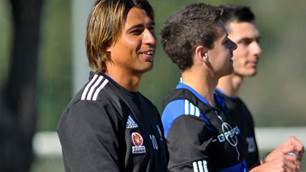He’s one of the most gifted players in the country but Nick Carle’s persistent snubbing by Socceroo coaches remains a mystery. Aidan Ormond tracks the Newcastle No.10’s roller-coaster career
Nick Carle won five Australian indoor titles as a junior. By 15 he’d exploded onto the NSL like a bolt of lightning. At 19, the Aussie had been signed by French super-coach Alain Perrin who threw him straight into the first team at Troyes. At 23, Carle was a bona-fide Hyundai A-League star at Newcastle Jets and one of the faces of the league’s much-hyped TV commercial. "How many dudes you know roll like this?" asked Scribe on the ad’s soundtrack. Not many, in Carle’s case.
Which makes the midfielder’s continued cold-shoulder by the senior national team – particularly when A-League players are needed to fill the breach – even more of a head-scratcher.
The recent Socceroos squad for the Asian Cup clash with Kuwait was entirely A-League-based. Carle was overlooked. The midfielder didn’t make the Asian Cup squad for last February’s match against Bahrain, either. And he was famously left out of Frank Farina’s Olympics squad for the Athens 2004 campaign.
Asked the perennial question of why he thinks he hasn’t been selected more often for the Socceroos – one appearance so far, a seven minute cameo in a friendly against Venezuela in 2004 – particularly when home based players are used, Carle pauses. "Look, it’s… I’m not sure,” he replies, obviously more hurt than he wants to reveal.
Carle has no shortage of admirers, despite the Socceroo snub. Former national and Olympic team coach Raul Blanco slams the non-selection of the Newcastle Jets midfielder as “strange” and "sad to see".
"It’s a good question: why hasn’t Nick played more for the national team?” asks Blanco. “I don’t know what the coaches in the national set up are looking for so I can’t say. But I can say, like everyone seems to acknowledge in Australia, he has a rare quality and magic skills. He can unlock a defence and has that unexpected skill.
"No question, he is one of the best players we’ve produced and is improving week by week. It’s sad to see such a talent not get his chance. It is strange but maybe they are looking for a different type of player."
Carle’s current coach at Newcastle, Nick Theodorakopoulos, describes the attacking midfielder’s touch as "Maradona-like", while Jets skipper – and former Socceroo captain – Paul Okon says Carle has the ability to "go far in football. You notice that South American style immediately. He is very, very talented."
"I’m a fan of his," says Fox Sports pundit Robbie Slater. "Nick’s the sort of player you’d pay to watch, he could be such a star. It’s probably a mental thing – how far can he go is up to him. Coaches may’ve gotten frustrated with his style. We come from a different footballing culture in this country, but he is definitely one of the best of the modern generation and he is yet to realise his full potential."
Different footballing culture sums up what most speculate: Carle simply doesn’t fit the mould. We’re not accustomed to playing a system with a number 10 in the way a South American nation would, even though Carle’s work-rate and defensive work improved immeasurably throughout last season.
Carle himself refuses to be drawn into the debate, but is nevertheless hurting. "Obviously I’m very, very disappointed," he tells FourFourTwo. "Once again, I’ve missed out. It’s a game of opinions. I thought I’d merited a chance, but Arnie picks the side, not me. I was over the moon when I got that call up in Venezuela. Since then, my national team career has just gone downhill.
"I feel the same as I did when I missed selection for the Olympic side in 2004 ("He was gutted," whispers Carle’s pregnant wife Mel to me while her husband is doing the photoshoot). "I still think that was the most disappointed I’ve been in my career."
Carle didn’t disappoint on October 5, 1997 when he made his senior debut as a 15-year-old. It was the Sydney NSL derby between traditional rivals Olympic –featuring a teenage Brett Emerton – and Marconi. It was dire, fourth division fare played on a terrible surface in front of just 7,007 at Aussie Stadium. It was “old football” at its worst. However, the arrival of Carle lit up the game when he was thrown on as a sub in the 75th minute.
His match winner in injury time was a thing of beauty. The Marconi defence failed to clear a ball on the edge of the box. Carle collected the ball with his left peg, swivelled and hit it cleanly past 2006 Socceroo squad keeper Ante Covic. It was a helluva way of introducing yourself – it even made
Channel 7’s sport report – but Carle is less enthusiastic about reliving this spectacular launch to his senior career.
“You probably remember it better than me!” he laughs. “It was a long time ago. I don’t like it being mentioned too much as a lot of people remember my career for that one goal and there’s been more to my career than just that. It was a good way to start but there were a lot of expectations after that.”
In hindsight, a move to the AIS – our nation’s finest finishing school for young footballers – is what Carle would have preferred following the flurry of interest.
“I think at 15, I was probably at a higher level than most players of my age,” he admits. “I think going to the AIS would’ve been better for my career than playing at Sydney Olympic.
“I saw a big improvement in players who went to the AIS. They were playing regularly. While at Sydney Olympic, for the next two years I was coming on for 15 minutes here and there. Which basically meant I trained for two years. I think I lost a lot.”
However, one by-product of success was that Carle was earning as much as most of his high school teachers. “I was still in school and whenever we got our win bonus it was $600-$800 in my pocket. For a school kid, I was over the moon!”
It’s frightening to think how much better Carle could’ve been if he had gone to the AIS rather than stay in school – he admits his right foot is only good for “stepping onto buses” while his finishing needs improving.
“I was known as a ‘super-sub’ which wasn’t something I liked and it wasn’t good for my career. I think it did slow up my progress,” reflects Carle, who grew up in the west of Sydney, one of Australia’s most fertile football areas.
Kimon Taliadoros played with Carle at Sydney Olympic in the late 90s. “I was amazed at Nick’s command of the ball and his ability,” says the one-time South Melbourne forward who played nine times for Australia. “Both Nick and [his brother] Leo were good, but particularly Nick.
“His speed of footwork was excellent. Moreover, he had a good character. He was determined but also respectful of the game and his teammates. He was only 15, but he was good enough to play in the first team.
“At 24, he’s probably still completing his football apprenticeship. I’ve no doubt he can excel at the highest level. He is one of the best ever to come out of Australia. With the right coaching he has all the basic ingredients you need for success.”
After five seasons with Olympic, Carle was developing into a rare talent. Leading French coach Alain Perrin came to the same opinion after he saw Carle trial with his French Ligue One side Troyes in early 2002. The move to France began very brightly, as Carle explains.
“Once I got there Alain Perrin, who personally signed me, kept saying, 'Where’s your visa?' which was a good sign. I trained for two weeks with the first team. I was lucky, a few players were at the African Nations Cup, so I got a chance.”
Carle was a fan of his new coach, too. “He was unbelievable, but I wasn’t surprised he didn’t do well in England [at Portsmouth last year he lasted eight months]. It doesn’t suit the style of football he liked. He took Troyes from the fourth division to first division in six years and then kept them there for three seasons. And the year he left, they dropped back down.”
Carle was living the dream from the moment he stepped off the plane. He had six appearances for Troyes in the first two months, with three starts. The Aussie got to play in front of 60,000 against PSG, which featured Ronaldinho and Nigerian ball-wizard Jay Jay Okocha. His first game was against an Auxerre side that had Djibril Cissé up front.
“But the game I really remember was when I started against Bordeaux,” he recalls of a Troyes side that finished seventh in the league. “It was a must-win game in front of 20,000 or so. The crowd was going crazy and for the first few minutes you couldn’t see anything because of all the flares that had been let off. The smoke, flares, the tickertape. It was everything I’d ever dreamed of. And I had a real good game. But, in the 70th minute, my knee went and I was out for the rest of the season.”
What’s more, Melissa, his then girlfriend (now wife) flew in from Australia on that day. She never got to see him perform at the highest level in France.
“A new coach came in the next season [Marseilles poached Perrin] and he brought in his own players,” remembers Carle. “The club spoke to me about dropping down to the second side because they had too many foreigners. And I was the youngest so it was easy for them to do that.”
What followed was a season “to forget” as he puts it. “The young boys were back playing in the second team in my second year. We finished top and the first team finished last. So, it says a lot… the coach was going to stick around so there was no point in me doing the same. I’m very much a confidence player. But injuries are all a part of soccer. He didn’t like me and it didn’t matter what I did, I wasn’t going to get a look-in.”
For Carle, an away match to a Didier Drogba-inspired Guingamp was the final straw. “We were losing 1-0 in a must-win game. With 20 minutes to go, and with two subs already used, the coach picks a defender, not me. That’s when I thought I’ve got to finish in France.”
Wife Melissa recalls that despite the usual issues foreigners face, it was a pleasant adventure. “The language was a barrier and I’d never been to Europe before. But the club was really good and we met some really nice people. We’d go to Paris on our days off. Now, looking back on it, it was a really good experience.”
Despite this frustrating end to his French football experience – and struggling with the cold European winter – Carle is leaving the door open for a return. “I know the French have been perceived as arrogant but it wasn’t true. We met so many lovely people. If the right move came along, I’d definitely go back.”
He returned to Australia on the advice of Olyroo/Socceroo boss Frank Farina. With the Athens Olympics just around the corner, Carle was told being home was best. The player says he knocked back an offer from Brondby after trialing with the Danish powerhouse because he thought he’d be involved in the Athens 2004 campaign. Wrong.
“Mel and I tried to organise our wedding around the assumption that I’d be in the Olympics side. I really put a lot into going to the Olympics. When I came home, it was after I’d spoken to Frank and he said my best chance of making it was coming home rather than not playing regularly over there [in France].”
After missing out on selection, Carle was offered the role of shadow player in the Olympics squad, which he rejected.
“I needed to keep earning money. I had mortgages. I’ve never had a real job and I wasn’t prepared to be a shadow player. There was nothing left for me. Asian leagues were closed and the only option was the NSW winter Super League [the tournament below the Premier League] to keep me fit and generate some income.”
The league decreed that they picked the side he played for and it was pulled out of a hat. Ryde City Gunners was Carle’s new club but what followed was what he describes as the low point of his professional career. Carle says after his French stint two years earlier, it was a harsh “reality check”.
“One day you can be up there, the next at the bottom. So that was my low point. In a professional sense it was something I’d rather forget but having said that, I met some really nice people and the players were unreal,” he says of a club that plays next to the picturesque Lane Cove river.
Like most Aussie-based players, the period between the end of the NSL in 2004 and the start of the Hyundai A-League in 2005 meant state league football or a shot overseas. Carle played for Marconi in the NSW Premier League, as well as starring in a rather bizarre match against a touring Libyan national team, won 1-0 by NSW (Gadaffi’s playboy son didn’t play).
Fast forward to 2006, and Carle couldn’t be happier at Newcastle. He loves the outdoors lifestyle and can often be found fishing off his boat. Carle is particularly impressed by the club’s new acquisition, Socceroo legend Paul Okon, a man Carle describes as “the signing of the entire league”.
“With Nick T on board, everyone knows he likes quick attacking football and the fans will respond to it,” enthuses Nick. “I’ve extended my contract. For me to go back overseas it would have to be something big. I’m enjoying life here, my wife is about to have our first baby. Family is very important to me, by that I mean my wife Melissa and our child.
“If the right move came along, I’m not ruling out anything, particularly Asia. For me, it’s hard to get to Europe because I don’t have an EU passport and I’m not a regular in the national team. That’s why Asia is a good avenue for me. But right now I’m concentrating on Newcastle and that only. I’ve got potentially five years there, which I’m rapt about.”
Carle played a lot of indoor football when he was a kid. He reckons it’s great in helping players improve ball control because you play in confined spaces. “One of my goals for the end of my career is to play for Australia at an indoor World Cup,” he says with a big smile.
Let’s just hope it’s not the only time he gets to represent his country.
Which makes the midfielder’s continued cold-shoulder by the senior national team – particularly when A-League players are needed to fill the breach – even more of a head-scratcher.
The recent Socceroos squad for the Asian Cup clash with Kuwait was entirely A-League-based. Carle was overlooked. The midfielder didn’t make the Asian Cup squad for last February’s match against Bahrain, either. And he was famously left out of Frank Farina’s Olympics squad for the Athens 2004 campaign.
Asked the perennial question of why he thinks he hasn’t been selected more often for the Socceroos – one appearance so far, a seven minute cameo in a friendly against Venezuela in 2004 – particularly when home based players are used, Carle pauses. "Look, it’s… I’m not sure,” he replies, obviously more hurt than he wants to reveal.
Carle has no shortage of admirers, despite the Socceroo snub. Former national and Olympic team coach Raul Blanco slams the non-selection of the Newcastle Jets midfielder as “strange” and "sad to see".
"It’s a good question: why hasn’t Nick played more for the national team?” asks Blanco. “I don’t know what the coaches in the national set up are looking for so I can’t say. But I can say, like everyone seems to acknowledge in Australia, he has a rare quality and magic skills. He can unlock a defence and has that unexpected skill.
"No question, he is one of the best players we’ve produced and is improving week by week. It’s sad to see such a talent not get his chance. It is strange but maybe they are looking for a different type of player."
Carle’s current coach at Newcastle, Nick Theodorakopoulos, describes the attacking midfielder’s touch as "Maradona-like", while Jets skipper – and former Socceroo captain – Paul Okon says Carle has the ability to "go far in football. You notice that South American style immediately. He is very, very talented."
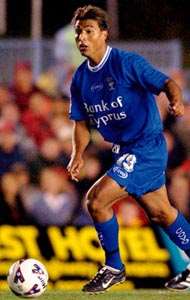 |
| A teenage Carle at Sydney Olympic |
"I’m a fan of his," says Fox Sports pundit Robbie Slater. "Nick’s the sort of player you’d pay to watch, he could be such a star. It’s probably a mental thing – how far can he go is up to him. Coaches may’ve gotten frustrated with his style. We come from a different footballing culture in this country, but he is definitely one of the best of the modern generation and he is yet to realise his full potential."
Different footballing culture sums up what most speculate: Carle simply doesn’t fit the mould. We’re not accustomed to playing a system with a number 10 in the way a South American nation would, even though Carle’s work-rate and defensive work improved immeasurably throughout last season.
Carle himself refuses to be drawn into the debate, but is nevertheless hurting. "Obviously I’m very, very disappointed," he tells FourFourTwo. "Once again, I’ve missed out. It’s a game of opinions. I thought I’d merited a chance, but Arnie picks the side, not me. I was over the moon when I got that call up in Venezuela. Since then, my national team career has just gone downhill.
"I feel the same as I did when I missed selection for the Olympic side in 2004 ("He was gutted," whispers Carle’s pregnant wife Mel to me while her husband is doing the photoshoot). "I still think that was the most disappointed I’ve been in my career."
Carle didn’t disappoint on October 5, 1997 when he made his senior debut as a 15-year-old. It was the Sydney NSL derby between traditional rivals Olympic –featuring a teenage Brett Emerton – and Marconi. It was dire, fourth division fare played on a terrible surface in front of just 7,007 at Aussie Stadium. It was “old football” at its worst. However, the arrival of Carle lit up the game when he was thrown on as a sub in the 75th minute.
His match winner in injury time was a thing of beauty. The Marconi defence failed to clear a ball on the edge of the box. Carle collected the ball with his left peg, swivelled and hit it cleanly past 2006 Socceroo squad keeper Ante Covic. It was a helluva way of introducing yourself – it even made
Channel 7’s sport report – but Carle is less enthusiastic about reliving this spectacular launch to his senior career.
“You probably remember it better than me!” he laughs. “It was a long time ago. I don’t like it being mentioned too much as a lot of people remember my career for that one goal and there’s been more to my career than just that. It was a good way to start but there were a lot of expectations after that.”
In hindsight, a move to the AIS – our nation’s finest finishing school for young footballers – is what Carle would have preferred following the flurry of interest.
“I think at 15, I was probably at a higher level than most players of my age,” he admits. “I think going to the AIS would’ve been better for my career than playing at Sydney Olympic.
“I saw a big improvement in players who went to the AIS. They were playing regularly. While at Sydney Olympic, for the next two years I was coming on for 15 minutes here and there. Which basically meant I trained for two years. I think I lost a lot.”
However, one by-product of success was that Carle was earning as much as most of his high school teachers. “I was still in school and whenever we got our win bonus it was $600-$800 in my pocket. For a school kid, I was over the moon!”
It’s frightening to think how much better Carle could’ve been if he had gone to the AIS rather than stay in school – he admits his right foot is only good for “stepping onto buses” while his finishing needs improving.
“I was known as a ‘super-sub’ which wasn’t something I liked and it wasn’t good for my career. I think it did slow up my progress,” reflects Carle, who grew up in the west of Sydney, one of Australia’s most fertile football areas.
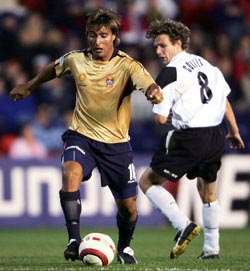 |
| Another defender left in his wake... |
Kimon Taliadoros played with Carle at Sydney Olympic in the late 90s. “I was amazed at Nick’s command of the ball and his ability,” says the one-time South Melbourne forward who played nine times for Australia. “Both Nick and [his brother] Leo were good, but particularly Nick.
“His speed of footwork was excellent. Moreover, he had a good character. He was determined but also respectful of the game and his teammates. He was only 15, but he was good enough to play in the first team.
“At 24, he’s probably still completing his football apprenticeship. I’ve no doubt he can excel at the highest level. He is one of the best ever to come out of Australia. With the right coaching he has all the basic ingredients you need for success.”
After five seasons with Olympic, Carle was developing into a rare talent. Leading French coach Alain Perrin came to the same opinion after he saw Carle trial with his French Ligue One side Troyes in early 2002. The move to France began very brightly, as Carle explains.
“Once I got there Alain Perrin, who personally signed me, kept saying, 'Where’s your visa?' which was a good sign. I trained for two weeks with the first team. I was lucky, a few players were at the African Nations Cup, so I got a chance.”
Carle was a fan of his new coach, too. “He was unbelievable, but I wasn’t surprised he didn’t do well in England [at Portsmouth last year he lasted eight months]. It doesn’t suit the style of football he liked. He took Troyes from the fourth division to first division in six years and then kept them there for three seasons. And the year he left, they dropped back down.”
Carle was living the dream from the moment he stepped off the plane. He had six appearances for Troyes in the first two months, with three starts. The Aussie got to play in front of 60,000 against PSG, which featured Ronaldinho and Nigerian ball-wizard Jay Jay Okocha. His first game was against an Auxerre side that had Djibril Cissé up front.
“But the game I really remember was when I started against Bordeaux,” he recalls of a Troyes side that finished seventh in the league. “It was a must-win game in front of 20,000 or so. The crowd was going crazy and for the first few minutes you couldn’t see anything because of all the flares that had been let off. The smoke, flares, the tickertape. It was everything I’d ever dreamed of. And I had a real good game. But, in the 70th minute, my knee went and I was out for the rest of the season.”
What’s more, Melissa, his then girlfriend (now wife) flew in from Australia on that day. She never got to see him perform at the highest level in France.
“A new coach came in the next season [Marseilles poached Perrin] and he brought in his own players,” remembers Carle. “The club spoke to me about dropping down to the second side because they had too many foreigners. And I was the youngest so it was easy for them to do that.”
What followed was a season “to forget” as he puts it. “The young boys were back playing in the second team in my second year. We finished top and the first team finished last. So, it says a lot… the coach was going to stick around so there was no point in me doing the same. I’m very much a confidence player. But injuries are all a part of soccer. He didn’t like me and it didn’t matter what I did, I wasn’t going to get a look-in.”
For Carle, an away match to a Didier Drogba-inspired Guingamp was the final straw. “We were losing 1-0 in a must-win game. With 20 minutes to go, and with two subs already used, the coach picks a defender, not me. That’s when I thought I’ve got to finish in France.”
Wife Melissa recalls that despite the usual issues foreigners face, it was a pleasant adventure. “The language was a barrier and I’d never been to Europe before. But the club was really good and we met some really nice people. We’d go to Paris on our days off. Now, looking back on it, it was a really good experience.”
Despite this frustrating end to his French football experience – and struggling with the cold European winter – Carle is leaving the door open for a return. “I know the French have been perceived as arrogant but it wasn’t true. We met so many lovely people. If the right move came along, I’d definitely go back.”
He returned to Australia on the advice of Olyroo/Socceroo boss Frank Farina. With the Athens Olympics just around the corner, Carle was told being home was best. The player says he knocked back an offer from Brondby after trialing with the Danish powerhouse because he thought he’d be involved in the Athens 2004 campaign. Wrong.
“Mel and I tried to organise our wedding around the assumption that I’d be in the Olympics side. I really put a lot into going to the Olympics. When I came home, it was after I’d spoken to Frank and he said my best chance of making it was coming home rather than not playing regularly over there [in France].”
After missing out on selection, Carle was offered the role of shadow player in the Olympics squad, which he rejected.
“I needed to keep earning money. I had mortgages. I’ve never had a real job and I wasn’t prepared to be a shadow player. There was nothing left for me. Asian leagues were closed and the only option was the NSW winter Super League [the tournament below the Premier League] to keep me fit and generate some income.”
The league decreed that they picked the side he played for and it was pulled out of a hat. Ryde City Gunners was Carle’s new club but what followed was what he describes as the low point of his professional career. Carle says after his French stint two years earlier, it was a harsh “reality check”.
“One day you can be up there, the next at the bottom. So that was my low point. In a professional sense it was something I’d rather forget but having said that, I met some really nice people and the players were unreal,” he says of a club that plays next to the picturesque Lane Cove river.
Like most Aussie-based players, the period between the end of the NSL in 2004 and the start of the Hyundai A-League in 2005 meant state league football or a shot overseas. Carle played for Marconi in the NSW Premier League, as well as starring in a rather bizarre match against a touring Libyan national team, won 1-0 by NSW (Gadaffi’s playboy son didn’t play).
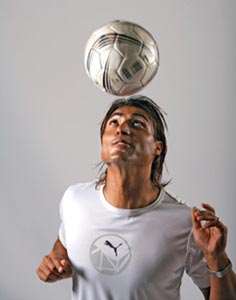 |
| Carle has all the skills including Jedi mind tricks |
Fast forward to 2006, and Carle couldn’t be happier at Newcastle. He loves the outdoors lifestyle and can often be found fishing off his boat. Carle is particularly impressed by the club’s new acquisition, Socceroo legend Paul Okon, a man Carle describes as “the signing of the entire league”.
“With Nick T on board, everyone knows he likes quick attacking football and the fans will respond to it,” enthuses Nick. “I’ve extended my contract. For me to go back overseas it would have to be something big. I’m enjoying life here, my wife is about to have our first baby. Family is very important to me, by that I mean my wife Melissa and our child.
“If the right move came along, I’m not ruling out anything, particularly Asia. For me, it’s hard to get to Europe because I don’t have an EU passport and I’m not a regular in the national team. That’s why Asia is a good avenue for me. But right now I’m concentrating on Newcastle and that only. I’ve got potentially five years there, which I’m rapt about.”
Carle played a lot of indoor football when he was a kid. He reckons it’s great in helping players improve ball control because you play in confined spaces. “One of my goals for the end of my career is to play for Australia at an indoor World Cup,” he says with a big smile.
Let’s just hope it’s not the only time he gets to represent his country.
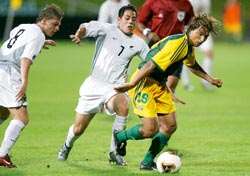 |
| Nick Carle looks to use his "good-for-stepping-onto-buses" right foot. |
Related Articles
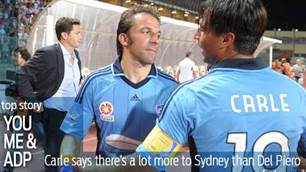
Carle: There's more to Sydney than ADP
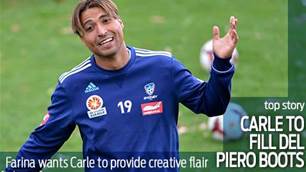
Carle to fill Del Piero's boots
